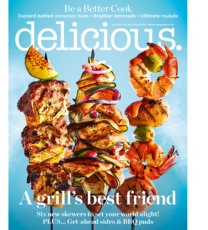Eat your way to a stronger immune system
Snuffling and sneezing your way through winter? Boost your body’s defences with food, says nutritionist Angela Dowden.

If you spend the colder months miserably lurching from one illness to another, some lifestyle changes – especially changes to your diet – might help. Unsurprisingly, fruit and vegetables (the teacher’s pets of the nutrition world) are vital in keeping the immune system fighting fit. In particular, fruit and vegetables rich in vitamin C, which can be found in high quantities in citrus fruits, kiwi fruits, berries,peppers and sweet potatoes.
To offset some of the decline in immune function that occurs as we age, it pays to include plant foods that are a good source of vitamin E. Sunflower seeds and oil are two of the very best, but you’ll also get significant amounts from other seeds and nuts and avocados, and more moderate amounts from mangoes, blackberries, tomatoes and sweet potatoes. Studies at the Human Nutrition Research Centre On Ageing at Tufts University, in Boston, USA, found that high doses of vitamin E administered to healthy individuals aged over 65 improved several measures of immune responsiveness; in some cases restoring the immune response of a 70-year-old to that expected in a 40-year-old.
Selenium, another immune-boosting antioxidant, works with vitamin E, so eat a handful of Brazil nuts (the best source of selenium) daily, or incorporate canned tuna and eggsinto your diet. It’s also a good idea to add garlic to your food, as it contains sulphur-based compounds that have natural antibacterial, antiviral and antifungal properties. You don’t need to eat whole raw garlic, however, just crush some in a little olive oil to make a dressing, or add it to a pasta sauce or soup.
During the season of winter sniffles, you also need to ensure you eat enough protein, which is vital for maintaining the linings in your airways and stopping bacteria and viruses taking hold. Two portions of meat, fish, chicken, eggs, nuts or pulses a day fit the bill, and if you can weave in three portions of lean red meat or seafood(oysters in particular) a week so much the better, as these will also keep up your zinc intake – another good immune booster.
Keeping mucus secretions in the respiratory passages healthy is another important way to keep infection at bay. Mucus provides a slippery surface that makes it harder for bacteria and viruses to infect our cells, but evidence shows that a deficiency of vitamin A can affect mucus production. Though the body can make vitamin A from beta-carotene found in orange-red vegetables (beta-carotene is found in large quantities in
carrots, which makes them an important immune enhancer) it pays to have a separate supply of the ready-formed vitamin, which you can get by eating oily fish, liver, cheese, eggs and butter.
Don’t forget to drink plenty, too. If you’re dehydrated, your respiratory and nasal passages can dry out, making infection more likely. Water is not the only rehydrating drink though – tea, coffee and juice also count, the exception being alcohol, of course. However, one or two units of alcohol a day can actually enhance immunity, so don’t feel guilty about having a glass or two of wine with dinner.
Ironically, some bacteria can actually help prevent infection. Probiotics – available as yogurt-based drinks – are packed with ‘friendly’ bacteria that colonise the colon wall and act as a barrier to invading germs. In one study published in the British Medical Journal, children who consumed a probiotic had fewer days of absence from day-care due to respiratory and gastrointestinal illnesses.
As for what not to eat, there is evidence suggesting that large quantities of sugar could be an enemy of the immune system, interfering with the ability of white blood cells to destroy bacteria. Prolonged stress can also weaken immunity. Being sedentary is another bad idea – moderate daily exercise boosts the immune system although arduous exercise, such as marathon running, can actually make respiratory infections more likely.
After every effort, if you still fall prey to infections, upping your vitamin C at the first sign of a sniff or scratchy throat may help. Though the vitamin can’t stop you getting a cold, research shows that high doses can minimise symptoms and shorten the duration by about a day. In this situation, food sources alone are not enough, so pop a 1,000mg supplement each day until symptoms have subsided.
More importantly, get some rest, and treat yourself to a little of your favourite comfort food. Because when you’re ill, more than at any other time, a little bit of what you fancy really does do you good
Subscribe to our magazine
Food stories, skills and tested recipes, straight to your door... Enjoy 5 issues for just £5 with our special introductory offer.
Subscribe
Unleash your inner chef
Looking for inspiration? Receive the latest recipes with our newsletter